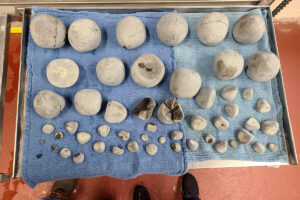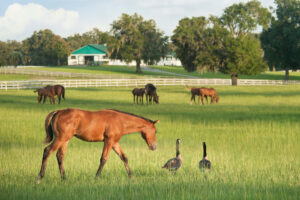Intravenous Nutrition for Colicky Horses
Horses which survive an episode of severe colic can be temporarily unable to eat. Anorexia, nasal regurgitation, and ileus (lack of bowel movement) prevent oral feeding. After several days of malnutrition, the horse’s ability to heal is impaired. Humans who are unable to eat normally are fed intravenously; this method is known as parenteral nutrition (PN). While PN has been used in horses, it
- Topics: Article
Horses which survive an episode of severe colic can be temporarily unable to eat. Anorexia, nasal regurgitation, and ileus (lack of bowel movement) prevent oral feeding. After several days of malnutrition, the horse’s ability to heal is impaired. Humans who are unable to eat normally are fed intravenously; this method is known as parenteral nutrition (PN). While PN has been used in horses, it is very expensive (typically $300 or more per day) and there is no data supporting its effectiveness. For this reason, researchers from the Marion duPont Scott Equine Medical Center at the Virginia Polytechnic Institute and State University decided to evaluate the benefits of PN in horses with severe gastrointestinal disease.
Records were reviewed for 78 horses which received PN as part of treatment for severe medical or surgical colic at the Marion duPont Scott Equine Medical Center. Three horses died, and 35 were euthanized as their conditions deteriorated. However, there was no evidence that PN contributed to any of the fatalities. The most common side effect of PN, seen in 76 of 79 cases (one of the horses out of the group of 78 in the study received PN twice), was hyperglycemia, or high blood sugar. In humans, this complication can be very severe, but horses in this study adjusted over time, and very few (three horses) needed insulin to correct the problem. One horse temporarily experienced seizures, which is another recognized complication of PN. Overall, 52% of the horses survived. However, the findings don’t provide evidence that PN had any benefit to surviving horses. Therefore, a study needs to be performed where horses are randomly assigned to receive PN or a placebo before the effectiveness of PN can be determined in horses.
Lopes, M.A.F.; White II, N.A. Equine Veterinary Journal, 34 (3), 250-257, 2002 TheHorse.com is home to thousands of free articles about horse health care. In order to access some of our exclusive free content, you must be signed into TheHorse.com. Already have an account?Create a free account with TheHorse.com to view this content.
Start your free account today!
and continue reading.
Related Articles
Stay on top of the most recent Horse Health news with

















